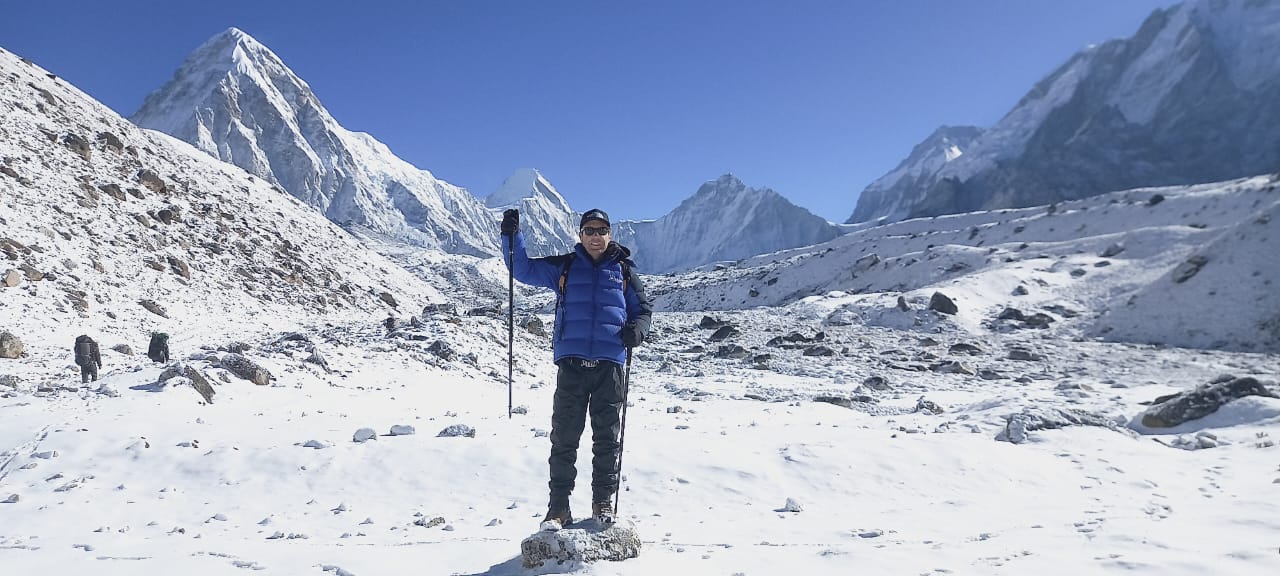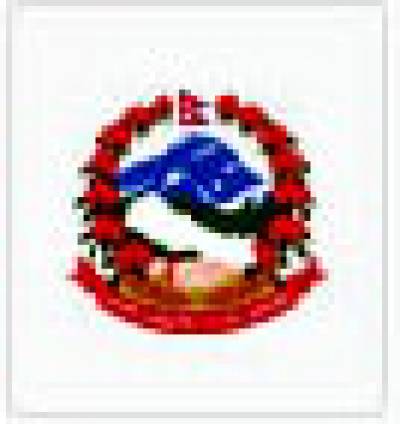ISLAND AND LOBUCHE PEAK CLIMBING
Lobuche and Island Peak combo climbing expedition is a thrilling adventure that offers a unique opportunity to conquer two popular peaks in the Everest region of Nepal. Lobuche Peak (6,119m) and Island Peak (6,189m), also known as Imja Tse, are both technically challenging climbs that require a good level of fitness and mountaineering skills. This expedition is perfect for experienced climbers looking to test their limits and add two prestigious peaks to their climbing resume.
The journey begins in Kathmandu, where you will have a chance to explore the vibrant capital city before flying to Lukla, the gateway to the Everest region. From Lukla, the trekking route takes you through picturesque Sherpa villages, lush forests, and high altitude landscapes, offering stunning views of the Himalayan peaks along the way. As you acclimatize to the altitude, you will gradually make your way to Lobuche Base Camp, where you will prepare for the ascent of Lobuche Peak.
Lobuche Peak offers a challenging climb with technical sections and breathtaking views of Everest, Lhotse, Nuptse, and other surrounding peaks. After successfully summiting Lobuche Peak, you will descend back to the base camp and continue your journey towards Island Peak.
Island Peak is another iconic peak in the Everest region, known for its stunning location and challenging climb. The ascent to Island Peak involves crossing a glacier, climbing steep snow and ice slopes, and navigating a narrow ridge to reach the summit. From the top of Island Peak, you will be rewarded with panoramic views of Ama Dablam, Makalu, Baruntse, and the Khumbu Valley below.
The Lobuche and Island Peak combo climbing expedition is a physically demanding and rewarding experience that will test your mountaineering skills, endurance, and determination. With the guidance of experienced Sherpa guides and a well-planned itinerary, you will have the best chance of successfully summiting both peaks and creating memories that will last a lifetime. This expedition is a must-do for adventure seekers looking to push their limits and experience the magic of the Himalayas up close.
ITINERARY
Day 1 : Arrival in Kathmandu (1300m) and transfer to hotel.
After arriving at Kathmandu Tribhuvan International Airport you will be warm welcomed by Sherpa Expedition and Trekking staff and taken to your hotel for a briefing of your journey to Lobuche peak Climbing, including the route taken and accommodation. We will clearly explain several do’s and don’ts with your safety a priority.
Day 2 : Fly from Kathmandu to Lukla (2840m) and trek to Phakding (2610m) Duration: 4-5 hours.
In the early morning, your guide will pick you up from your hotel and take you to the domestic terminal at Kathmandu airport before heading to Lukla, a 40-minute flight. During the flight, you will see some of the most spectacular views of the Himalayas. After arrival at Tenzing-Hilary airport, you will be met by your porter who will carry your luggage. Then your trekking begins. Today you trek is around 3 hours and is relatively easy going The trail passes a Kani (ceremonial gatehouse) before a steep descent before leveling off and passing through Kyangma village which has a large gompa (monastery) and school. After leaving Kyangma village we reach Cheplung village and then descends through a community forest within sight of the Dudh Koshi River. After crossing a suspension bridge there is a short climb across the ridge to Ghat. After leaving Ghat the trail passes a school and a complex of mani walls, Chortens and prayer wheels. We then climb to the hamlet of Chhuthawa and then a short walk to Phakding. Overnight stay at a mountain lodge. Breakfast, lunch & dinner included.
Day 3 : Trek from Phakding to Namche Bazaar (3440m) Duration 5-6 hours.
In the morning our trek passes over a bridge spanning the Dudh Kosi River, passing several delightful villages of Toktok, Bhenkar, and Monjo before arriving at the entrance gate to Sagarmatha National Park, and then trek along the river bed for a few hours and cross our last bridge before a steep uphill trek to Namche Bazaar. Namche has many good restaurants, pubs, a cyber café, post office, and banks. Breakfast, lunch & dinner included.
Day 4 : Acclimatization Day at Namche Bazaar: (3,440m/11,284ft )
This is the scheduled 'acclimatization' day for this trek. Health experts always recommend us to stay active and moving during the rest day and suggest we remain active and avoid being idle. We can choose to spend the day taking a day hike to Thame or visiting Khunde or relaxing and exploring Namche Bazaar itself. Namche Bazaar is the main center of the Everest (Khumbu) region and has government offices, ATMs, Internet cafes, shops, restaurants, a bakery, and a colorful market each Friday evening and Saturday. If we trek a few hundred vertical feet during the day, it will help us to properly acclimatize. Our guides will take us to the Tourist Visitor Center near the headquarter of the Sagarmatha National Park where we can observe an assortment of things related to the first Everest ascenders, Sherpa culture and learn about the various plant and animal life of the Everest region. We also take an interesting side trip up to Khumjung. We climb up to the famous airstrip at Syangboche. Just above the airstrip is the Everest View Hotel, a Japanese scheme to build a deluxe hotel with great views of the highest mountains on Earth. The Khumjung valley is surrounded by the snowy peaks of Kongde and Thamserku and the sacred peak Khumbila, hosts a well-known monastery that houses a yeti scalp. We also visit Hillary School which is at the same site. After having lunch and spending some time in Khumjung, we walk back down to Namche Bazaar. Breakfast, Lunch & Dinner Included.
Day 5 : Trek from Namche Bazaar to Tengboche (3,870m/12,694ft) Duration: 5-6 hours.
After breakfast in Namche, we commence our trek to Tengboche with dazzling views of Mt. Everest, Nuptse, Lhotse, Ama Dablam and a close-up view of Thamserku. Our trek to Tengboche has a few ups and downs with spectacular views of Himalaya. On the trek, we may be lucky to spot some native wildlife, such as pheasant, musk deer, and maybe a herd of Himalayan Thar. The trail gradually descends to Kayangjuma before reaching Sansa, which is a major junction to Gokyo valley and Everest Base Camp. The track then follows through pine forests and passes prayer flags festooned on the bridge over the Dudh Koshi River. We then reach Phunki Thenga, a small settlement with a couple of teahouses and a small army post in the midst of alpine woods. After having a relaxed lunch at Phunki Thenga we then have a little tough steep climb through pine forests before arriving at Tengboche. Tengboche where there are some glorious in-your-face of Ama-Dablam, Nuptse, and Everest. Tengboche boasts of having the biggest Buddhist monastery in the Khumbu region. A visit to the monastery at around 3 p.m to see a ceremony performed by the monks. Breakfast, lunch & dinner Included.
Day 6 : Trek from Tengboche to Dingboche (4,360 m/14,300 ft) Duration 5-6 hours.
A clear morning is the best time to see the exquisite monastery in Tengboche. This is a perfect time to unleash the camera! We then continue our trek taking the upper trail taking advantage of the views to witness the view of this ancient monastery before passing through several Chortens and Mani walls and several small villages. While enjoying our lunch break we can take in the fantastic close-up views of Ama-Dablam. The afternoon takes us north to Pheriche, or alternatively, we can take the trail heading east beneath the towering north face of Ama Dablam. From this point, the trek is fairly easy-going before we enter the Imja Valley. The valley gradually opens up as we approach the confluence of the Lobuche River. We then descend into the river and begin the last and steepest climb of the day up to Dingboche On arrival in Dingboche, we see a spectacular array of fields enclosed by stone walls to protect the barley, buckwheat, and potatoes from the cold winds and grazing animals. Breakfast, lunch & dinner included.
Day 7 : Acclimatization day at Dingboche and hike to Chukkung Valley (4730m) Duration: 4-5 hours.
It is sensible to spend another day acclimatizing before heading to higher altitudes. One way of doing this is to hike up to Chukkung Valley (4730m) and on to Island Peak (Imja Tes). Above Dingboche is Nagkartshang Gompa (a strenuous trek takes around 2 to 3 hours), or alternatively head to Pheriche for an afternoon lecture on altitude sickness. The trail to Chhukung leaves Dingboche heading to Bibr (4570m) and is surrounded by fabulous mountain Peaks: Taboche, Nuptse, Lhotse, the enormous flute-shaped pass of Amphu Laptsa Pass, Ama Dablam. Chukkung has several lodges and is the most popular spot for those climbing Island Peak. If trekkers feel better acclimatized they can head up a grassy slope towards the peak of Chukkung Ri (5550m) for a magnificent view of Makalu. Breakfast, lunch & dinner included.
Day 8 : Trek from Dingboche to Lobuche (4930) Duration: 5-6 hours.
Any easy trek after breakfast takes us to Dugla before traversing the steep moraine of the Khumbu Glacier. After crossing the glazier we then pass through the boulder-strewn slopes as we ascend Chupki Lhara passing an array of stones with prayer flags used as memorials to Scott Fischer (American mountaineer) and 10-time Everest summiteer Babu Chiri Sherpa (Nepalese mountain guide) who perished on a mission to climb Everest. The trail then continues to the Khumbu Glacier moraine where before us are some of the great Himalayan peaks - Khumbutse, Lingtren, Pumori and Mahalangur Himal. Overnight stay in Lobuche. Breakfast, lunch & dinner included.
Day 9 : Trek from Lobuche to Gorak Shep (5170 m/16,961ft) and hike to Everest Base Camp (5364 m/17,594 ft) Duration: 6-7 hours.
The trail to Gorak Shep passes through the moraine of the Khumbu Glacier passing the pyramid signpost. Soon after we get views of the crest of the north ridge of Everest along with Mt. Pumori, Mahalangur, Lingtern, Khumbutse &Nuptse. A short climb takes us to Thangma Riju from where we have a jaw-dropping 360-degree vista of snow-covered mountains. A steep climb leads us to the top crossing the Changri Glacier and our first glimpse of Kala Patthar, a grey-green mound beneath Mt. Pumori. As we reach Gorak Shep, we are once again surrounded by snow-capped mountains in every direction including the highest mountain in the world - Mount Everest. After a brief lunch break and time to relax we head along the trail to Everest Base Camp through the Gorak Shep Lake. After reaching Everest Base Camp we will appreciate those Everest climbers whose accent follows the hazardous route through the Khumbu Icefall. From Base Camp, we can see the magnificent peaks of Nuptse, Khumbuste, and Pumori. Everest is not within view from Base Camp. We then head back to Gorak Shep for a well-deserved night's rest. Most trekkers agree that the sunset view from Kala Patthar is better than the view at sunrise. The setting sun strikes the snow-capped mountains with mesmerizing beauty. Some trekkers may choose to continue with our guides and Sherpas and arrange a hike to Kala Patthar to witness the awesome sunset view rather than waiting until tomorrow. Breakfast, lunch & dinner included.
Day 10 : Hike up to Kala Patthar (5545 m/18,192 ft) and trek to Lobuche (4940 m/16,207 ft) Duration: 6-7 hours.
Today is special and is the highlight of our journey. An early morning start allows us to catch the dramatic views from Kala Patthar seeing the new day and the light shining on Mount Everest. We need to be prepared for the dark and cold temperatures (-10 to -14 C) before departing on our trek. It is not uncommon to experience some very chilling winds. In the east are many peaks, such as Lingtren, Khumbutse, Changtse with Everest gradually exposing itself reveal itself between the west shoulder crest and Nuptse. During the ascent to Kala Patthar, we can pause to catch our breath at several outstanding viewpoints to snap pictures. After several hours of climbing, we reach Kala Patthar before scrambling over a rocky outcrop close to the summit and its cairns and prayer flags. After reaching the summit we can sit on the Kala Patthar rocks absorbing the spectacular views of the Himalayas. From one rock massif to another we are rewarded with numerous opportunities to use our cameras and photo opportunities that will remind you of these enormous mountains. We then head back to Gorak Shep where we have breakfast before a gradual descent to Lobuche for a well deserved night's rest. Breakfast, lunch & dinner included.
Day 11 : Trek from to Lobuche High Camp (5,600m/18,368 ft) Duration: 3-4 hours.
After breakfast, we make our way from Lobuche to Lobuche High Camp. The climb takes about 4 hours. The High camp is located at an altitude of 5,600m/18,368 ft. From Base Camp, we follow a path across a rocky moraine before reaching High Camp. Once we reach High Camp we prepare our camp for the overnight stay, have lunch and relax. If you walk around, rather than sit around, this will help you to acclimatize to this high altitude. Breakfast, lunch & dinner included.
Day 12 : Summit day Lobuche Peak (6119m/20,070 ft) Summit & back to Dingboche Duration: 7-10 hours.
Today is the day we have been anxiously awaiting. We start our day in the early hours in order to reach the summit. Lobuche East offers more panoramic views of the mountains than other peaks - such as Island Peak. Arriving at Lobuche summit you can take in spectacular, panoramic and exhilarating views of Everest, Lhotse, Nuptse, Ama Dablam, Cholatse, Pumori, and other nearby peaks. Our time at the summit is spent taking photos and taking a short rest before descending back to Dingboche. Breakfast, lunch & dinner included.
Day 13 : Trek from Dingboche to Chukhung (4,750m) Duration: 2-3 hours.
From Dingboche, there is a short hike to Chhukung, the final settlement of the Khumbu region around Imja Tse (also known as Island Peak) with its magnificent panorama of snowcapped mountains with Mt. Makalu in the east. After arriving at Chhukung we can rest or hike to Chhukung Ri for more amazing views of the mountains. It will also allow us time to prepare for our early morning departure to Kongma-la Pass.
Day 14 : Trek to Island Peak base camp (5,200m/17,060ft) Duration: 4-5 hours.
Although Island peak does not require technical expertise, it does however require strength and stamina. It does however require some basic skills and how to avoid mishaps. It is essential that we reach the summit before lunch, as in the afternoon it can be extremely windy. The path climbs hundreds of meters from the bottom camp before facing a sharp incline initially on a sandy trail before turning to grass, and finally over boulders. The path eventually narrows before entering a steep rock vale (narrow channel of rock). We finally, after many steps across and through the vale emerge on the other side Your guide, for safety reasons, may fix a rope to each climber to assist in climbing the final snowy slope to the ridge at the summit. The rope may often extend to 350m depending on the season and danger of crevices. Some of these crevices may be 2 to 3 meters across requiring the use of ladders. Once at the summit it is time to take out your camera and capture the magnificent views and get your breath back!. We will then descent to Island Peak Base Camp, and with your guides, will celebrate our success. Meals - breakfast, lunch & dinner.
Day 15 : Island Peak base Camp to Summit Island Peak summit (6,189m/20,305ft), back to Chhukung Duration: 10-12 hours.
Although Island peak does not require technical expertise, it does however require strength and stamina. It does however require some basic skills and how to avoid mishaps. It is essential that we reach the summit before lunch, as in the afternoon it can be extremely windy. The path climbs hundreds of meters from the bottom camp before facing a sharp incline initially on a sandy trail before turning to grass, and finally over boulders. The path eventually narrows before entering a steep rock vale (narrow channel of rock). We finally, after many steps across and through the vale emerge on the other side Your guide, for safety reasons, may fix a rope to each climber to assist in climbing the final snowy slope to the ridge at the summit. The rope may often extend to 350m depending on the season and danger of crevices. Some of these crevices may be 2 to 3 meters across requiring the use of ladders. Once at the summit it is time to take out your camera and capture the magnificent views and get your breath back!. We will then descent to Chhukung, and with your guides, will celebrate our success.
Day 16 : Trek from Chhukung to Namche Bazaar (3,440m/11,286ft) Duration: 6-7 hours.
Leaving Chhukung we return on the same path to Imja Khola heading up through the forest to Tengboche. If there is enough interest we can visit the nuns at their Tengboche residence. After lunch at Tengboche we descend along a path surrounded by alpine bush and juniper trees. After crossing the bridge over the Dudh Koshi watercourse, our path takes us to Dudh Koshi Gorge taking us through pine forests before finally reaching Sansa. On the way down we should keep our eyes peeled for glimpses of mountain goats, snow leopards, colorful pheasants, and other wildlife. After emerging from the forest we pass through Chorten before reaching the military camp at Namche Bazaar. Tonight we stay at Namche Bazaar.
Day 17 : Trek from Namche Bazaar to Lukla (2,800m/9,186ft) Duration: 6-7 hours.
The rocky path down is steep and it is advised to be cautious crossing this rocky landscape. We eventually cross the suspension bridges over the rapid flowing Dudh Koshi and its tributaries, where the path becomes flatter and easier to negotiate. After our arrival in Lukla we can stretch our aching legs and blissfully recall the exhilarating experiences of the last few weeks. Meals - breakfast, lunch & dinner.
Day 18 : Fly back to Kathmandu (1,350m/4,428ft).
Today we take a morning flight to Kathmandu. In Kathmandu, we can reminisce and can shop for souvenirs. Our guides will steer you in the right direction and where to find some bargains!
Day 19 : Final Departure from Kathmandu
Your journey in Nepal involves an Associate in the trip finish today! there's nothing to try to however trade emails together with your travel companions and organize your photos. A representative from Sherpa Expedition and Trekking can take you to the airdrome, about three hours before your regular flight. On your means home, you'll need much time to set up your next journey within the marvelous country of Nepal.
SERVICES
Costs included in your package.
- Airport picks up and transports by private Car/Jeep.
- Two night’s standard twin sharing Hotel in Kathmandu with breakfast.
- Three meals a day (Breakfast, lunch, and dinner) during the trek.
- Fresh fruit every evening after dinner.
- Trekking Lodge (Tea House) during the trek and tent camp accommodation during climbing session.
- All necessary paperwork including Sagarmatha National Park Entry Permit & Khumbu Pasang Lhamu Rural Municipality fees.
- Kathmandu-Lukla-Kathmandu (Ramechhap -Lukla- Ramechhap) flight with private airport transfer and domestic airport tax.
- A highly experienced, helpful, knowledgeable, friendly, English speaking well trained, Government license holder guide with all his salary, food, drinks, accommodation, transport and insurance.
- Climbing permit of Island Peak and Lobuche.
- Strong, helpful Sherpa porters with proper safety equipment and walking equipment, his salary, food, accommodation, and insurance (one porter for two people).
- Comprehensive medical supplies (first aid kit will be available).
- Arrangement of emergency helicopter service (paid by your Travel Insurance Company).
- Use of sleeping bag, down jacket, duffel bag and walking poles (if you don’t have your own, to be returned after trip completed).
- Sherpa Expedition and Trekking T-shirt
- Government taxes and official expenses.
- Trip achievement certificate after successful trip completion.
- Oxygen meter to check your pulse and oxygen saturation and heart rate twice daily (Very useful to check Altitude Mountain Sickness(AMS) symptoms) which will ensure your health during the trek.
- Assistant guide for groups of 8 or more people.
Costs Exclude
- Meals whilst you are in Kathmandu - lunch, and dinner.
- Nepal entry visa fee (easy to obtain the visa on arrival at Tribhuvan International Airport – Kathmandu). $30 USD for 15-day, $50 USD for 30 Days, and $125 USD for 90 Days visa.
- Personal travel and medical insurance.
- International airfare.
- Your personal expenses.
- All the alcoholic and nonalcoholic, soup, tea, coffee, hot chocolate, cocoa, mineral water, extra food, cold and hot drinks on trek ( i.e. those you choose to purchase along the way and during evenings in the tea houses)
- All desserts & sweet things like chocolate, cake, pie, pudding.
- Hot shower and battery charging at the tea houses.
- Tips for the guide, porter, and driver (tipping is expected)
- Excess baggage of more than 10 kg for Lukla flight.
- NOTE: If you return earlier from the trek due to sickness or any problem, the money you paid for the flight, hotel, mountain room, food, etc. is nonrefundable, and you will need to bear the expenses for the hotel, food, etc. in Kathmandu yourself.
EQUIPMENTS
You will be carrying all of your gear and share some of the cluster gear. Keeping your pack light is important, so choose light-weight clothing and equipment. Be sure to have a range of clothing suitable for all conditions. Sudden change of weather may require layering of clothing. Three layers will meet your needs. Avoid cotton or fabrics that do not maintain heat when cold. Comfortable durable wool (or proven fabrics) that breathe and expel sweat lends itself to an additional pleasant experience!'
We will offer complimentary water and a windproof duffle that you'll use on the trek - carried by porters. The duffle is yours to keep once at the end of the trek. You can safely leave your bag, together with your non-trekking requirements, at our office in Katmandu and collect them upon your return.
All equipment, such as base camp tents, room accessories, climbing rope, ice screws, snow bar and ice hammer is provided by Sherpa Expedition & Trekking.
Upper Body:
- Base Layers: Moisture-wicking and quick-drying shirts and thermal tops.
- Insulation Layers: Fleece or down jackets to provide warmth.
- Waterproof Shell Jacket: A durable and breathable jacket to protect against wind and rain.
- Softshell Jacket: A lightweight and water-resistant jacket for added protection.
- Climbing Harness: A comfortable harness to secure yourself to the rope.
- Helmet: A strong and well-fitting helmet to protect your head from falling objects.
- Gloves: A combination of lightweight liner gloves and insulated gloves or mittens for warmth and dexterity.
- Buff or Neck Gaiter: To protect your neck and face from cold and wind.
- Sunglasses: Polarized and UV-protected sunglasses to shield your eyes from the sun and snow glare.
- Goggles: Ski or mountaineering goggles for added eye protection in extreme weather conditions.
Lower Body:
- Base Layers: Moisture-wicking and quick-drying thermal bottoms.
- Insulation Layers: Fleece or insulated pants for added warmth.
- Waterproof Shell Pants: Durable and breathable pants to protect against wind, rain, and snow.
- Softshell Pants: Lightweight and water-resistant pants for added protection.
- Mountaineering Boots: Sturdy and insulated boots designed for snow and ice.
- Crampons: Attachable spikes that provide traction on icy terrain.
- Gaiters: Waterproof and breathable gaiters to keep snow out of your boots.
- Socks: A combination of moisture-wicking liner socks and thick, warm mountaineering socks.
Other Essential Items:
- Backpack: A spacious and sturdy backpack to carry your climbing gear and personal belongings.
- Sleeping Bag: A warm and lightweight sleeping bag that can withstand sub-zero temperatures.
- Trekking Poles: Adjustable trekking poles for added stability and support.
- Headlamp: Essential for climbing in low-light or dark conditions.
- Water Bottles: Insulated water bottles to keep your water from freezing.
- Sunscreen: High SPF sunscreen to protect your skin from the strong sun at high altitudes.
- First Aid Kit: A comprehensive first aid kit with essential medications and supplies.
- Climbing Snacks: Energy bars, nuts, and other lightweight snacks for quick fuel during the climb.
It is important to invest in high-quality gear and ensure that everything fits properly and is in good condition. Additionally, consult with experienced climbers or a professional guide to ensure you have all the necessary gear and receive proper training on how to use it effectively and safely.
GOOD TO KNOW
If you are considering climbing Island Peak, here are some important things to know:
1. Island Peak, also known as Imja Tse, is located in the Everest region of Nepal. It stands at an elevation of 6,189 meters (20,305 feet) and is a popular climbing destination for mountaineers.
2. Prior climbing experience is recommended as Island Peak is a technical climb. Basic mountaineering skills such as using crampons, ice axe, and rope techniques are necessary.
3. Acclimatization is crucial due to the high altitude. It is advisable to spend a few days in the Everest region, acclimatizing and trekking to higher altitudes before attempting the climb.
4. A climbing permit is required to climb Island Peak. This can be obtained through a registered trekking agency in Nepal. Make sure to check the latest permit regulations and fees.
5. Hiring a local guide or joining a guided expedition is highly recommended. They have the expertise, knowledge of the route, and can provide support and safety during the climb.
6. The best time to climb Island Peak is during the pre-monsoon (spring) season (April to May) and post-monsoon (autumn) season (September to November). These months generally have more stable weather conditions and clear views.
7. Proper gear and equipment are essential for a safe and successful climb. This includes mountaineering boots, crampons, ice axe, climbing harness, helmet, layers of warm clothing, gloves, and other necessary climbing gear.
8. Physical fitness and endurance are important for climbing Island Peak. Regular exercise, cardiovascular training, and strength-building activities are recommended to prepare your body for the physical demands of the climb.
9. It is important to be aware of altitude sickness and its symptoms. Take necessary precautions, such as proper acclimatization, staying hydrated, and following the guidance of your guide.
10. Respect the local culture and environment. Island Peak is located in Sagarmatha National Park, a UNESCO World Heritage Site. Follow the Leave No Trace principles, adhere to local customs, and be mindful of the fragile mountain ecosystem.
Always prioritize safety and consult with experienced climbers or professional guides for further information and guidance specific to your Island Peak climbing expedition.
MAP
PHOTOS/Videos
Departures
Select a departure month
Fill out the form below and a Travel Expert will reach out to create your perfect tour.
FAQS
What is the best time of year to climb Lobuche and Island Peak?
The best seasons for climbing Lobuche and Island Peak are typically during the pre-monsoon (spring) season from March to May and the post-monsoon (autumn) season from September to November. These months offer stable weather conditions and clearer skies, ideal for high-altitude climbing.
What is the level of difficulty for Lobuche and Island Peak climbs?
Both Lobuche and Island Peak climbs are considered challenging due to their technical terrain and high altitude. Prior mountaineering experience, physical fitness, and acclimatization are essential for a successful ascent of these peaks.
Do I need a climbing permit for Lobuche and Island Peak?
Yes, climbers are required to obtain permits for both Lobuche and Island Peak climbs. The permits can be arranged through authorized trekking agencies in Nepal, along with necessary documentation and fees.
What is the accommodation like during the Lobuche and Island Peak climbing expedition?
Accommodation during the climbing expedition typically includes a combination of teahouses, camping, and high-altitude lodges. Basic facilities are available, and climbers are advised to be prepared for rustic conditions at higher elevations.
Is prior mountaineering experience necessary for Lobuche and Island Peak climbs?
While prior mountaineering experience is not mandatory, climbers should have a good level of physical fitness, trekking experience at high altitudes, and basic technical climbing skills. Training and preparation are essential for a safe and successful ascent.
Are there any age restrictions for Lobuche and Island Peak climbs?
Climbers must be at least 18 years old to attempt Lobuche and Island Peak climbs. Additionally, individuals should be in good health and physical condition to undertake the challenges of high-altitude mountaineering.
What safety measures are in place during the Lobuche and Island Peak climbing expedition?
Experienced guides, support staff, and porters accompany climbers throughout the expedition to ensure safety and provide assistance as needed. Adequate acclimatization, proper gear, and emergency protocols are in place to mitigate risks associated with high-altitude climbing.
What happens in case of medical emergencies during the Lobuche and Island Peak climbs?
In the event of a medical emergency, climbers are evacuated to lower altitudes for treatment. It is essential to have travel insurance that covers high-altitude climbing and medical evacuation to address any unforeseen health issues during the expedition.
Latest Traveller’s Reviews
Travel experiences of our clients who recently returned from their trips.
100%
Based On 895 Reviews
Reena Kuhrram
United States
September 17, 2024
Wonderful Experience from Start to Finish
I had a wonderful experience trekking to Everest Base Camp with Sherpa Expedition and Teams. The level of professionalism and care was evident from the start. Our guides were excellent at facilitating our acclimatization and ensuring everyone was in good spirits. The breathtaking landscapes and the warm hospitality in the teahouses made the trek unforgettable. I felt a true sense of camaraderie with fellow trekkers, all thanks to the fantastic atmosphere the Sherpa team created.
Daniella Garcia
Austria
September 2, 2024
Unforgettable Journey
My trek to Everest Base Camp with Sherpa Expedition Teams was nothing short of magical. The guides were incredibly knowledgeable and attentive, ensuring our safety and comfort throughout the journey. The breathtaking views, especially of Khumbu Glacier, left me in awe. Every meal was delicious, and the teahouses were cozy. I felt genuinely supported every step of the way. I highly recommend Sherpa Expedition for anyone seeking an adventure of a lifetime!
Laurence Fang
United States
August 29, 2024
Epic Adventure!
Trekking with Sherpa Expedition and Teams was an epic adventure. Their expertise in organizing the trek was apparent, and our guide was a wealth of knowledge. The trek itself was challenging yet thrilling, with stunning views that took my breath away. I felt safe and supported throughout, and the local culture added an enriching layer to the experience. Reaching Everest Base Camp was a dream realized. I wholeheartedly recommend this team for anyone looking for an incredible trek!
People Considering This Package Right Now Check availability






















